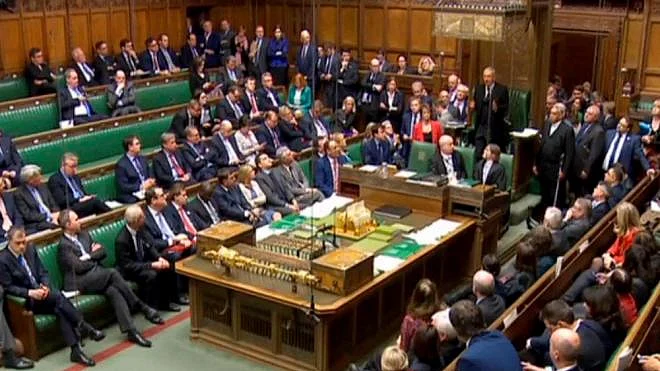In Britain, voters now want leaders who can ‘break the rules’
Britain is stressed like never before. And manifestations are tired MPs, a surge for post-graduate degrees and British schoolchildren required to know what ‘fronted adverbials’ are

The growing clamour for “strong leaders” that has seen the rise of authoritarian figures like Narendra Modi, Donald Trump, and Tayyip Erdogan has now caught the fancy of British voters in what is seen as a backlash against Theresa May’s pathetically weak leadership.
More than half want "a strong leader willing to break the rules," according to a survey by Hansard Society, Britain’s premier research body on parliamentary affairs.
Its 2019 audit of political engagement in Britain makes grim reading with trust in the current political system at an all-time low amid a deepening crisis over Brexit. It found that 54 per of those polled calling for a strong, rule-breaking leader.
Some 66% said politicians should be able to say what is on their mind regardless of what anyone else thinks about their views; and 42% think many of the country's problems could be tackled more effectively if the government didn't have to worry about Parliament’s approval.
Most expressed a feeling of “powerlessness and disengagement" under the current system. They wanted “radical solutions” to problems even if it meant breaking rules or offending some people.
“People are pessimistic about the country’s problems and their possible solution, with sizeable numbers willing to entertain radical political changes,” the report said.
Ruth Fox, director of Hansard Society, warned that the findings threatened the “core tenets of democracy”.
"Preferring a strong leader who is willing to break the rules...would challenge core tenets of our democracy," she said describing the results “a potentially toxic recipe for the future of British politics.”
Margaret Thatcher was the last “strong” (read “authoritarian”) leader Britain had, and her policies proved so toxic that her own party was forced to oust her. That 30 years later, Britons are apparently asking for another Thatcher says something about the times we live in.
Brexit blues
The seemingly never-ending Brexit farce has not only made Britain a laughingstock around the world and divided the country like never before, but apparently it is now affecting MPs’ mental health.
A number of MPs have spoken about how they are finding it hard to cope with the mental stress brought on by Brexit-induced tensions. One has taken to hiding in a cupboard near the House of Commons chamber to avoid having to talk to anyone on the issue.
“I close the door, turn the light off and put my jacket over me. It’s quite dark,” Tory MP Andrew Percy told the BBC.
“I voted for no-deal twice. I voted for the prime minister’s deal three times. I voted for the Norway option a couple of times. Whatever you do you still get shouted at,” he added.
Another said he switched off his TV when Brexit was debated. He felt “like the soldier in 1917, who’s been in the trenches since the start of the war”.
“I have never seen more frazzled MPs, physically and mentally, and I do seriously fear for the mental health of some of my colleagues,” said senior Tory MP Tim Loughton.
There are reports about MPs “bursting into tears” because they’re not able to spend time with their families. Geoffrey Cox, the attorney-general, said he was “increasingly fatigued” and had taken to reading poetry. Many are seeking counselling to retain their sanity.
Here’s wishing them luck!
India-style degree deluge
British universities are seeing a sudden surge in demand for Master’s degrees—a sign that much like in India a mere degree no longer fetches a premium in the job market. This in a country where until recently a university degree was regarded as a class privilege and guaranteed professional success.
Employers are now spoilt for choice when looking for university educated employees. And they are becoming more demanding —prompting young people to seek extra qualifications to stand out. Last year, over a quarter of a million master’s degrees were awarded, a record.
“A master’s used to be reserved for those seeking a career in academia. Now it is much more democratic. Many more young people have degrees, and most of those are good degrees, so it is seen as something that will set them apart when they start their careers, as well as simply an opportunity to learn more,” one admissions head told The Times.
Democratisation? Or devaluation?
As conspiracy theories go, this one is in a class of its own. Tabloids and Twitter are buzzing with gossip that Meghan Markle is faking her pregnancy to gain popularity!
Meghan’s “false bump” has even acquired a hashtag —#Megxit. To rhyme with Brexit, perhaps.
Here’s a flavour of the bizarre exchanges: “Well, I have 2 college degrees and 1 Master degree. I also speak 3 languages. I’m definitely ‘educated’ and I still think everything about Meghan is fake, including her pregnancy,” wrote one.
Meghan has been a persistent target of covert racist attacks because of her mixed race and her independent views that don’t often sit well with a stuffy royal family. Many of the anti-Meghan stories are suspected to have been fed by Palace insiders close to her sister-in-law the Duchess of Cambridge Kate Middleton.
And, lastly, here’s a test of how good is your English grammar: what’s a “fronted adverbial”? Little schoolchildren in Britain are expected to know it.
Follow us on: Facebook, Twitter, Google News, Instagram
Join our official telegram channel (@nationalherald) and stay updated with the latest headlines
